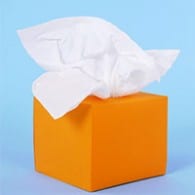9 Ways to Allergy Proof Your Child
If you suspect your child has allergies, or if allergies run in the family, there are many things a parent can do to both lessen their child’s chance of becoming allergic and how severely these allergies bother the child:
1. An allergy-free womb environment.
Especially if you have a family history of allergies you can reduce your child’s risks of later becoming allergic by reducing your exposure to allergens while you’re pregnant. This is especially true of food allergies. Avoid or eat sparingly the most common food allergens: nuts, eggs, cows milk, eggs, and shell fish. (Sometimes also wheat and soy.)
The intestines are the body’s nutritional gate keeper, letting into the blood the right proteins and keeping out the proteins that may harm the body – called allergenic proteins, or allergens. In the early months your baby’s intestines are more porous; the “gate” in the intestinal lining is open, allowing foreign proteins to get through. Around six months the intestines mature and the gate begins to close, selecting some proteins and rejecting others – an intriguing process called closure. Giving your baby only your milk until the intestines mature is the safest way to keep potentially allergenic proteins out of baby’s blood.
Delay nuts, egg whites, shellfish, and dairy products, especially cow’s milk, until after age one if there is a known family history of allergies to these foods.
Click here for a discussion on allergy proofing your child’s home.
In addition to removing fuzzy stuffed animals and furry toys from the child’s crib or bed, avoid down or feathered pillows and comforters. Try non-allergenic pillows and mattress covers. A subtle allergen is the form board made with formaldehyde. Check with the manufacturer whether the bedroom furniture contains wood made with formaldehyde.
Don’t allow smokers in your home or around your child. Now that you are a parent you have another reason to quite this life-limiting habit. “but I only smoke outside,” you may rationalize. You still will carry the allergens from the smoke on your hair and clothing, to which your child is exposed during those hugs and cuddles. It may be more socially polite to use your doctor as a scapegoat: “Our doctor says she very allergic to cigarette smoke.”
Studies show that children in daycare have more respiratory infections (ear infections, sinus infections, and asthma) which can aggravate allergies. The effect of daycare on allergies depends on other factors such as how many children in how small a space and how much time they spend indoors and outdoors. If possible choose a daycare that has the fewest number of children, and the largest amount of indoor space and if possible one that encourages children to spend a lot of time outdoors.
If your child has allergies or you have a strong family history of allergies avoid a location that is:
- Downwind from freeways or busy traffic intersections.
- Near fields that have a lot of allergenic plants such as ragweed.
- Has a lot of allergenic foliage.
- An older home that is damp and harbors a lot of mold.
- Has a basement full of mold.
The nose is the door to that allergens enter the body. Get in the habit of flushing out your child’s nose with salt water.

